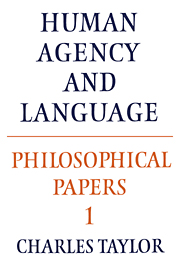1 - What is human agency?
Published online by Cambridge University Press: 05 June 2012
Summary
I would like to explore in this paper what is involved in the notion of a self, of a responsible human agent. What is it that we attribute to ourselves as human agents which we would not attribute to animals?
This question takes us very far indeed, and into several issues of capital importance in philosophy. I am not even going to try to sound them all. But I'd like to make a preliminary exploration of the terrain, using as my guide a key notion which has been introduced recently by Harry Frankfurt, in order to see how well the territory of the self may be mapped with its aid.
The key notion is the distinction between first- and second-order desires which Frankfurt makes in his ‘Freedom of the will and the concept of a person’. I can be said to have a second-order desire when I have a desire whose object is my having a certain (first-order) desire. The intuition underlying Frankfurt's introduction of this notion is that it is essential to the characterization of a human agent or person, that is to the demarcation of human agents from other kinds of agent. As he puts it,
Human beings are not alone in having desires and motives, or in making choices. They share these things with members of certain other species, some of which even appear to engage in deliberation and to make decisions based on prior thought. […]
- Type
- Chapter
- Information
- Philosophical Papers , pp. 15 - 44Publisher: Cambridge University PressPrint publication year: 1985
- 122
- Cited by



